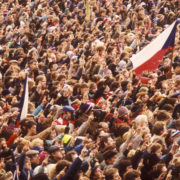On November 17, Czechs commemorate student demonstrations under the Nazi occupation in 1939 and against the Communist regime in 1989. The later one led to the so-called Velvet Revolution which culminated in the appointment of the country’s first non-communist government in more than four decades and the election of Vaclav Havel, a playwright turned dissident, to the post of president.
Several concerts, exhibitions, parades, discussions, author´s readings as well as lectures will be held in Prague, as well as other towns or villages in the Czech Republic.
Events on the day are scheduled at a memorial on Narodní třída, as well as Albertov and on Prague’s Wenceslas Square which saw the number of demonstrators in the days of the Velvet Revolution swell to almost one million.
On Národní St, a street feast called Korzo Národní will take place. It is organized by the initiative Thanks, that we can (Díky, že můžem, z. s). Its programme features concerts, theatre performances, exhibitions, lectures and a presentation of non-profit organizations.
A satiric carnival parade called Sametové posvícení will set for a journey through Prague at Republiky Square; participants will parade through Prague 1 and end at Wenceslas Square. The parade is organized by the Iniciativa Fór_um, z. s.
In the National Theatre, there will be held an award ceremony. The Post Bellum, o.p.s. will award those who behave bravely in the time of totality.
The Charles University ´s Centre of Fellowships, Students, and Graduates is organizing a memorial event at Albertov.
The peak of the festival will be a concert at Wenceslas Square, organized by Nerudný fest.cz.
Struggle for Freedom and Democracy Day is most closely associated with the Velvet Revolution, which began Nov. 17 in 1989, but it also refers to a student protest from 1939. The earlier protest against the German occupation began Oct. 28, 1939, and led to arrests of students and deportations to concentration camps.
Students marked the 50th anniversary of that event with rallies and marches Nov. 17, 1989. Police broke up the protest and some students were beaten. This led to 11 days of widespread protests and strikes.
Further information here
Author: red
Support Prague Morning!
We are proud to provide our readers from around the world with independent, and unbiased news for free.
Our dedicated team supports the local community, foreign residents and visitors of all nationalities through our website, social media and newsletter.
We appreciate that not everyone can afford to pay for our services but if you are able to, we ask you to support Prague Morning by making a contribution – no matter how small 🙂 .




